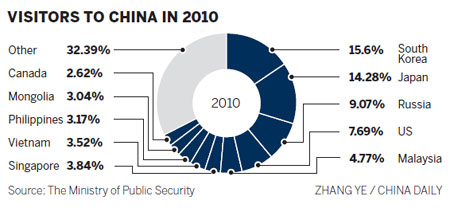Bio-data proposal for foreign visitors
Updated: 2011-12-27 07:30
By Zhao Yinan and Zhang Chunyan (China Daily)
|
|||||||||
Draft legislation aims to improve procedures for arrivals, departures
BEIJING / LONDON - Foreign visitors may be fingerprinted under draft legislative proposals being considered by the top legislature on Monday.
The draft law on entry and exit procedures, for the first time, allows the Ministry of Public Security and the Ministry of Foreign Affairs to put in place a system to gather biological identification data, such as fingerprints, on foreign visitors.
The draft also stipulates that foreigners should be fingerprinted by public security departments when they apply for a residential certificate.
The regulations currently stipulate that foreigners staying for longer than a year should apply for a residential certificate, while the proposed draft requires visitors to do so within a month after entering China, "if their visa requires".
Liu Guofu, an immigration law professor with the Beijing Institute of Technology, said foreigners who stay longer than a year are usually foreign employees and overseas students.
"Visas for temporary trips, such as sightseeing, usually permit a stay no longer than half a year," he said.
Liu said some European Union countries have also imposed similar fingerprint regulations on foreigners.
Yang Huanning, vice-minister of public security, told lawmakers at their bimonthly session that fingerprints and other biotechnology information are "effective measures" in identification and can speed up arrival and departure procedures at customs.
The draft, an integration of the current separate rules for foreigners and Chinese citizens, aims to "facilitate exchanges while making sure that those who should not enter are kept out", Yang said.
Rapid development has brought both economic opportunities and "new situations and problems", setting a higher standard on social management.
China witnessed 260 million arrivals and departures from January to September. This represented a massive increase from 12.1 million in 1980.
|
|
The number of arrivals and departures has been increasing by 10 percent annually since the 1990s, according to the ministries of public security and foreign affairs.
A number of countries, including the Republic of Korea, Switzerland and Norway, have started encoding fingerprint information in their digital passports. China is also promoting digital passports.
Robin Tsukada, a Japanese student at Tsinghua University, said an increasing number of foreigners are coming to China for work and study, and it's necessary to streamline the procedures.
A Norwegian man in his 50s, who has been a resident of China for about 10 years, said taking fingerprints was "fashionable" in Western countries.











